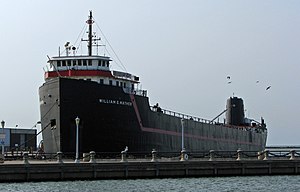Steamship William G. Mather Museum

William G. Mather at Dock 32, Cleveland, Ohio, in 2006
|
|
| History | |
|---|---|
| Name: | William G. Mather |
| Namesake: | William G. Mather |
| Builder: | Great Lakes Engineering Works, Ecorse, Michigan |
| Launched: | 23 May 1925 |
| Out of service: | 1980 |
| Status: | Museum ship |
| General characteristics | |
| Type: | Lake freighter |
| Tonnage: | 8,662 GRT |
| Length: | 618 ft (188 m) |
| Beam: | 62 ft (19 m) |
| Draft: | 32 ft 10 in (10.01 m) |
| Propulsion: |
|
| Capacity: | 14,000 tonnes of cargo |
| Crew: |
|
The Steamship William G. Mather (Official Number 224850) is a retired Great Lakes bulk freighter now restored as a museum ship in Cleveland, Ohio, one of four in the Great Lakes region. She transported cargo such as ore, coal, stone, and grain to ports throughout the Great Lakes, and was nicknamed "The Ship That Built Cleveland" because Cleveland's steel mills were a frequent destination.
Note: from 1905 till 1925 the Cleveland-Cliffs Iron Company had another vessel named S.S. William G. Mather (O.N. 202542) in their fleet, also built by Great Lakes Engineering Works. This former SS William G. Mather was renamed SS J. H. Sheadle in 1925, and SS H. L. Gobeille in 1955. After she had been sold to Gartland Steamship Co. she was renamed SS Nicolet in 1965.
She was built in 1925 by Great Lakes Engineering Works, Ecorse, Michigan, as the flagship for the Cleveland-Cliffs Iron Company and was named in honor of the then-company president, William Gwinn Mather. William G. Mather remained the Cliffs' flagship until Edward B. Greene (now Kaye E. Barker of the Interlake Steamship Company fleet) was built in 1951-52. She remained an active part of the Cliffs' fleet until the end of the 1980 navigation season.
In order to supply the Allied Forces need for steel during World War II, William G. Mather led a convoy of 13 freighters in early 1941 through the ice-choked Upper Great Lakes to Duluth, Minnesota, setting a record for the first arrival in a northern port. This heroic effort was featured in the 28 April 1941 issue of Life. She was one of the first commercial Great Lakes vessels to be equipped with radar in 1946. In 1964, she became the very first American vessel to have an automated boiler system, manufactured by Bailey Controls of Cleveland, Ohio.
...
Wikipedia
